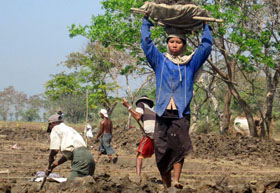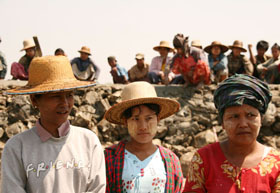Background and Objectives
Background

Cyclone Nargis devastated over 42,194 households in the coastal township of Dedaye which was directly on the path of the Category 5 Cyclone, damage levels for Dedaye were categorized as very severely affected as per the Periodic Review (2008) exercise conducted by the TCG, with over 98% of all households in the area affected. Efforts by the humanitarian community and international agencies have addressed the needs of approximately 10,399 of these households through some kind of support, either by providing material support, cash grants or a small number of rebuilds. This still leaves a gap of 31,855 houses belonging to the most vulnerable families that are yet to be supported with any type of shelter assistance. Traditional bigger agencies continue to operate in other townships In the Delta such as Bogale, Labutta and Pyapon whereas only a few other agencies continue to operate in Dedaye.
The programme seeks to support the holistic rehabilitation of vulnerable communities settled along the coastline in Dedaye township, who suffered complete and direct impact from the Cyclone Nargis and who have to date, not received any shelter rehabilitation support. All of Dedaye was subjected to the onset of the cyclone as it passed right over the entire township suffering complete damage with almost 99% of all shelters are fully damaged or destroyed.
Objectives
UN-HABITAT's Coastal Settlements Sustainable Recovery Programme (CSSR- Rebuilding Homes-Rebuilding Lives) is designed to facilitate the communities rebuilding their own homes through the people's process. People can proactively participate in recovery while re-establishing community-based social protection measures; thus community capacity to plan and manage the recovery process is enhanced leading to sustained long-term development.
Activities
* Community Mobilization and field verification of potential beneficiaries prioritized as most-vulnerable
* Formation of Village Recovery Committees (VSRCs)
* Community Actions Planning (within the villages these VSRs will collaborate with the community in order to select beneficiaries)
* Rebuilding of new shelters and Retrofitting and structural of shelters
* Conduct UN-HABITAT's DRR training and on-the ground demonstrations of rebuilding or upgrading their shelters for selected carpenter, artisans, masons, labourers.
* Construction of individual household latrines and hand-washing units
* Construction/Upgrading of village ponds, bridges and jetties, flood protection embankment
* Upgrading of village access roads and footpaths, manmade navigation canals for boats, drainage/sewer in the village
* Drain Cleaning and excavation of culverts
Results

* 1000 families rehabilitated with shelters on legal land plot, ceramic jars with water filters, household latrines and hand washing units
* Over 100 local craftsmen trained on disaster resilient construction practices and provided with toolkits for livelihoods
* 4 ponds constructed/upgraded as water source for Community and nearby villages
* 15,500 Rft of village flood protection embankment dykes constructed
* 4 bridges/jetties and 4 drainage systems installed or improved
* No. of man hours of work generated as part of Shelter, WASH and Basic Access interventions
Development Partners / Partners
Development Partners: USAID
Partners: UNHCR, land advisor from the SLRD department of the Ministry of Agriculture, Regional Hub Offices of the Recovery Coordination centre (RCC) of the Tripartite Core Group(TCG).
- The Project for Emergency Support to Poor and Vulnerable Communities in Ethnic Areas
- A Short Step from Improved WASH to Healthier Communities
- The Programme for Emergency Assistance to Poor and Vulnerable Community in Ethnic Minority Areas and Yangon
- Safe and Sustainable Access to WASH for Rural Communities
- Shelter Recovery Programme – Post Giri Affected Areas
- Shae Thot ‘The Way Forward’
- Land Administration and Management Programme (LAMP) in Myanmar
- Safer Coastal and Urban Communities through DRR in Myanmar
- Disaster Risk Reduction for Safe & Resilient Burmese Coastal Communities
- The Programme for Development and Rehabilitation of Community in Ethnic Minority Area, Myanmar
- Myanmar Climate Change Alliance (MCCA)
- Rebuilding Homes-Rebuilding Lives – Coastal Settlements Sustainable Recovery (CSSR)
- Rebuilding Homes-Rebuilding Lives – Coastal Settlements Support Programme (CSSP)
- Coastal Communities Livelihood Assistance Programme (CLAP)
- Disaster Response & Preparedness – Resilient Coastal Communities and Urban Risk (DRP-CURB)
- Shelter Improvement and Disaster Risk Reduction Project
- Community Water Supply and Sanitation Recovery
- Community Based Disaster Risk Reduction (CBDRR)
- Support to the Coordination of Early Recovery Shelter Interventions-Shelter Cluster Lead
- Semi-permanent Schools in Ayeyarwady Delta in Myanmar / Multi-purpose Schools in Ayeyarwady Delta in Myanmar






































